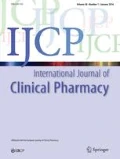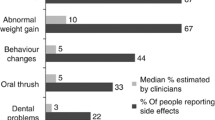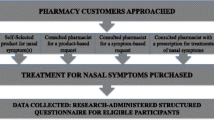Abstract
Compliance is a well recognised but still unresolved health problem; improvement of compliance to treatment would increase cost‐effectiveness. One of the current methods used to measure treatment compliance in a clinical drug trial is through the use of a patient diary. In order to interpret data in these diaries it is important to also assess how compliant patients are in completing diaries. Patient compliance of standard diary completion was measured in 69 patients with perennial rhinitis, who were randomised into a double blind, placebo controlled trial with a new corticosteroid drug. During 3 months the patients were instructed to complete a diary twice a day for the following parameters: rhinitis signs and symptoms, dosage times, concomitant medication, use of rescue medication and comments. Diaries were reviewed by the physician at scheduled visits. Twenty patients (30%) completed their diaries for all items perfectly, while 62 patients (94%) completed more than 95% of all items. The compliance of diary completion in a well controlled trial is high. Overall completion of the diary was not influenced by age, gender, race, use of concomitant medication or treatment failure. Significant correlations were found for study duration and physician. This study suggests that completion of a daily diary is positively correlated with patient compliance in medication intake. Physicians could consider using diaries to try to improve compliance. More explicit investigations are needed.
Similar content being viewed by others
References
Homedes N. Do we know how to influence patients behaviour? Tips to improve patients adherence. Fam Pract 1991;8: 412-23.
Korsch BM, Fine RN, Negrete VF. Noncompliance in children with renal transplants. Pediatrics 1978;61:872-6.
Sbarbaro JA. The patient-physician relationship: compliance revisited. ANN Allergy 1990;64:325-31.
Wright EC. Non-compliance or how many aunts has Matilda? Lancet 1993 Oct 9;342(8876):909-13.
Sackett DL, Haynes RB. Compliance with therapeutic regimens. Baltimore: Johns Hopkins University Press, 1976.
Waldmann JM, Bilder SM, Freeman NC, Friedman M. A portable datalogger to evaluate recall-based time-use measures. J Expo Anal Environ Epidemiol 1993 JanMar;3(l):39-48.
Roth HP, Caron HS. Accuracy of doctors statements on adherence to a drug regimen. Clin Pharmacol Ther 1978;23:361-70.
Gilbert JR, Evans CE, Haynes RB, Tugwell P. Predicting compliance with a regimen digoxin therapy in family practice. Can Med Assoc J 1980;123:119-22.
Masur FT. Adherence to healthcare regimens. In: Prolop CK, Bradley LA, eds. Medical psychology. New York: Academic Press, 1981.
Schwartz D, Wang M, Leitz L, Goss MEW. Medication errors made by elderly, chronically ill patients. Am J Publ Health 1962;52: 2018-29.
Tashkin DP, Rand CS, Nides M, Simons MS, Wise RA, Coulson AH, Li VC, Gong H Jr. A nebulizer chronolog to monitor compliance with inhaler use. Am J Med 1991;91 4A:33-6.
Rand CS, Wise Ra, Nides M, Simons MS, Bleecker ER, Kusek JW, Li VC. MDI adherence in a clinical trial. Am Rev Respir Dis 1992;146:1559-64.
Rand CS. Measuring adherence with therapy for chronic diseases: implications for the treatment of Heterozygous Familial Hypercholesterymia. Am J Cardiol 1993;72: 68D-74D.
Blackwell B. Compliance. Psychoter Psychosom 1992;58: 161-9.
Rudd P, Marshall G. Resolving problems of measuring compliance with medication monitors. J Comliance Health Care 1987;2: 23-35.
Meichenbaum D, Turk DC. Facilitating treatment adherence: a practitioner's guidebook. New York: Plenum Press, 1987.
Kist van Holte tot Echten JE, Nauta J, Hop WC, de Jong MC, van Luijk WH, Ploos van Amstel SL, Roodhooft AM, Noordzij CM, Wolff ED. Protein intake can not be estimated from urinary urea excretion. Pediatr-Nephrol. 1992 Jan;6(l):85-7.
Kranegor NA, Epstein L, Johnson SB, Yaffe SJ, eds. Developmental aspects of health compliance behavior. Hillsdale NJ: Laurence Erlbaum ass. 1993;13: 303-19.
Rand CS, Wise RA. Measuring adherence to asthma medication regimens. Am J Respir Crit Care Med 1994 Feb;149: S69-76.
Gonder Federick LA, Julian DM, Cox DJ, Clarke WL, Carter WR. Self-measurement of blood glucose. Accuracy of selfreported data and adherence to recommend regimen. Daibetes-Care 1988 Jul-Aug;11(7): 579-85.
Gong H Jr, Simmons MS, Clark VA, Tashkin DP. metereddose inhaler usage in subjects with asthma: comparison of Nebulizer Chronolog and daily diary recordings. JallergyClin-Immunol 1988 Jul;82(l):5-10.
Neugebauer R. Reliability of seizure diaries in adult epileptic patients. Neuroepidemiology 1989;8(5):228-33.
Oliver NF, Matsui D, Hermann C, Koren G. Compliance assessed by the Medication Event Monitoring System. Arch Dis Child 1991;66:1399-1402.
Malo Jl, L'Archeveque J, Trudeau C, d'Aquino C, Cartier A. Comment in: J Allergy Clin Immunol 1994 Aug;94(2 Ptl): 273-4. j-Allergy-Clin-Immunol 1993 Mar;91(3):702-9.
Kraag GR, Gordon DA, Menard HA, Russell HS, Kalish GH. Patient compliance with tenoxicam in family practice. Clin Ther 1994 May-Jun;16(3):581-93.
Miller-Johnson S, Emery RE, Marvin RS, Clarke W, Lovinger R, Martin M. Parent-child relationships and the management of insulin-dependent diabetes mellitus. J Consult Clin Psychol 1994 Jun;62(3):603-10.
Elliott WJ. Compliance strategies. Curr Opin Nephrol Hypertens 1994 May;3(3):271-8.
Broekhuysen AM, Vreugdenhil G, Thien TH. Therapietrouw: bepalende factoren en mogelijkheden ter verbetering. Ned Tijdschr Geneeskd 1994 23 april;138(17):850-4.
Rights and permissions
About this article
Cite this article
van Berge Henegouwen, M., van Driel, H. & Kasteleijn‐nolst trenité, D. A patient diary as a tool to improve medicine compliance. Pharm World Sci 21, 21–24 (1999). https://doi.org/10.1023/A:1008627824731
Issue Date:
DOI: https://doi.org/10.1023/A:1008627824731




